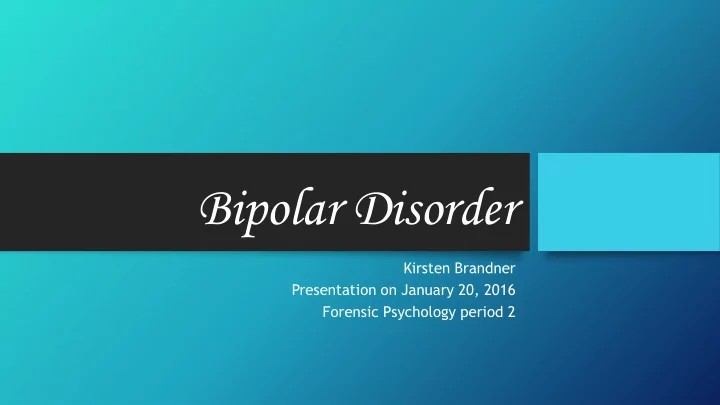

Bipolar Disorder Kirsten Brandner Presentation on January 20, 2016 Forensic Psychology period 2
Questions and Vocabulary to think about? • What is bipolar disorder? • What is rapid cycling and how does it relate to bipolar disorder? • Name and briefly explain one type of the five episodes. • What are the four types of bipolar disorder? • How can bipolar disorder be treated?
What is bipolar disorder? • It is also known as “Manic Depression.” • Bipolar Disorder is a brain disorder that causes unusual shifts in mood, energy, and the ability to function. • To have bipolar disorder, you must be diagnosed by a medical doctor.
Regular mood swings or bipolar disorder? • Intensity: Bipolar Disorders “mood swings” are much more severe than a simple change of emotion. • Length: A bad mood is usually gone in a few days but mania or depression can last weeks or months. • Everyday life: Bipolar Disorder and the symptoms can disrupt your life greatly, if you have a depressive episode, you may not be able simply to get up out of bed and a manic episode could cause you to go without sleep for days.
What is rapid cycling? • Rapid cycling is a pattern of frequent, episodes in bipolar disorder. • In rapid cycling, a person with bipolar disorder experiences four or more manic or depressive episodes within a year.
What is an “episode”? • An episode is an event or a series of events taking place in course of continuous events. • Manic episode- A period of elevated, expansive, or irritable mood with symptoms like inflated self-esteem, decreased need for sleep, distractibility, hyperactivity, and recklessness. • Hypomanic episode- A period of elevated, expansive, or irritable mood. A hypomanic episode has similar symptoms to a manic episode, but they're not as severe.
What is an “episode”? (continued) • Major depressive episode- Daily and day long depressed mood or loss of interest and pleasure in almost all activities. Can also include altered appetite, weight or sleep patterns, difficulty thinking or concentrating, fatigue, feeling worthless, inappropriate guilt, and thoughts or plans to commit suicide. • Mixed episode- When criteria is met for both a major depressive episode and a manic episode nearly every day with quick changing moods and symptoms from both types of episodes.
What are the types? • Each type of Bipolar Disorder is defined by length, frequency, and pattern of episodes of manic and depression. • Type 1- One or more manic episodes or mixed episodes occurring nearly every day for one week, most severe form of the illness. • Type 2- Characterized by one or two major episodes and at least one hypomanic episode with possible periods of level mood between episodes.
What are the types? (continued) • Cyclothymia- Milder form, including several hypomanic and less severe episodes that switch back and forth for at least two years. • Not otherwise specified (NOS)- Does not follow a particular pattern, re-occurring hypomanic episodes and less severe without depressive symptoms or very rapid swings between some symptoms of mania and some of depression.
What are the symptoms? • A person can experience anger, anxiety, apathy, apprehension, euphoria, general discontent, guilt, hopelessness, inability to feel pleasure, loss of interest, rapid mood swings, sadness, and/or elevated mood. • Remember! Just because you may feel these emotions or they change quickly, it does not mean you have bipolar disorder. These moods are usually heightened and much more severe. Do not self diagnose!
How can you treat it? • Bipolar Disorder is not curable, but you can go through treatment to help with the symptoms and how much it affects your life. • People generally take medication to help make episodes and symptoms less severe.
Demi Lovato and bipolar depression • “I’ve seen some dark places, especially with the depressive phases.” • “I’m living proof that someone can live, love, and be well with bipolar disorder when they get the education, support, and treatment they need.” • “People living with mental illness often have low expectations because they’ve been hurt or disappointed in the past.” • Demi Lovato went on a world tour sharing her experiences with mental illness and she wants to help others be proud of who they are no matter what they’re experiencing and to ask for help. • She also wants society to helps others, she wants the shaming of people with mental illness to stop, and for everyone to be accepting of one another.
Recommend
More recommend